Business Law & Ethics: Analysis of UK Employment Law and CSR Report
VerifiedAdded on 2023/06/11
|8
|1964
|362
Essay
AI Summary
This essay provides an overview of UK employment law, discussing key legislations like the Employment Rights Act 1996 and the Equality Act 2010, and analyzes whether the law favors employers or employees. It also explores the concept of Corporate Social Responsibility (CSR), examining the extent to which corporations in the UK take it seriously, highlighting both companies that prioritize CSR and those that do not, while considering the factors influencing CSR implementation. Desklib offers a platform for students to access similar solved assignments and past papers for comprehensive learning.
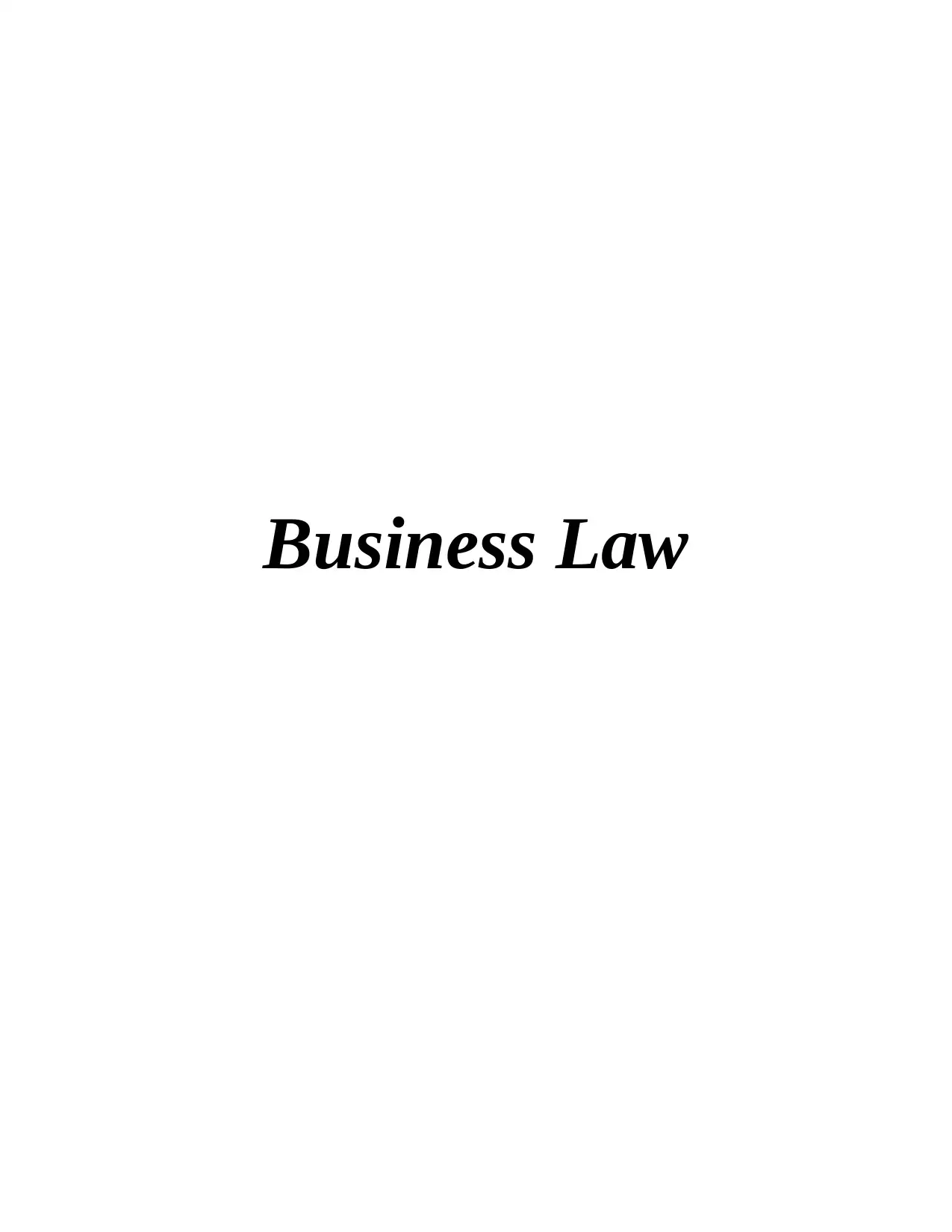
Business Law
Paraphrase This Document
Need a fresh take? Get an instant paraphrase of this document with our AI Paraphraser
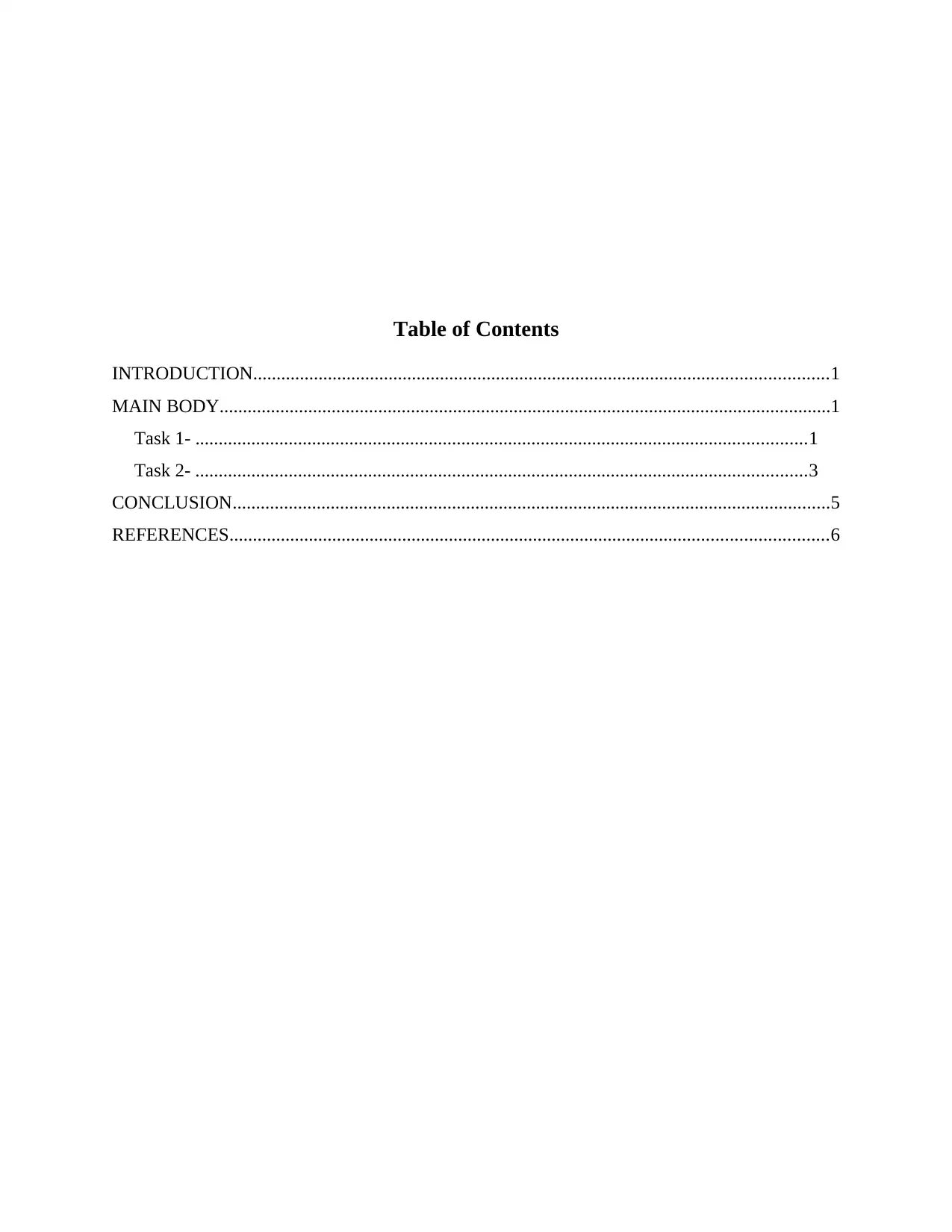
Table of Contents
INTRODUCTION...........................................................................................................................1
MAIN BODY...................................................................................................................................1
Task 1- ...................................................................................................................................1
Task 2- ...................................................................................................................................3
CONCLUSION................................................................................................................................5
REFERENCES................................................................................................................................6
INTRODUCTION...........................................................................................................................1
MAIN BODY...................................................................................................................................1
Task 1- ...................................................................................................................................1
Task 2- ...................................................................................................................................3
CONCLUSION................................................................................................................................5
REFERENCES................................................................................................................................6
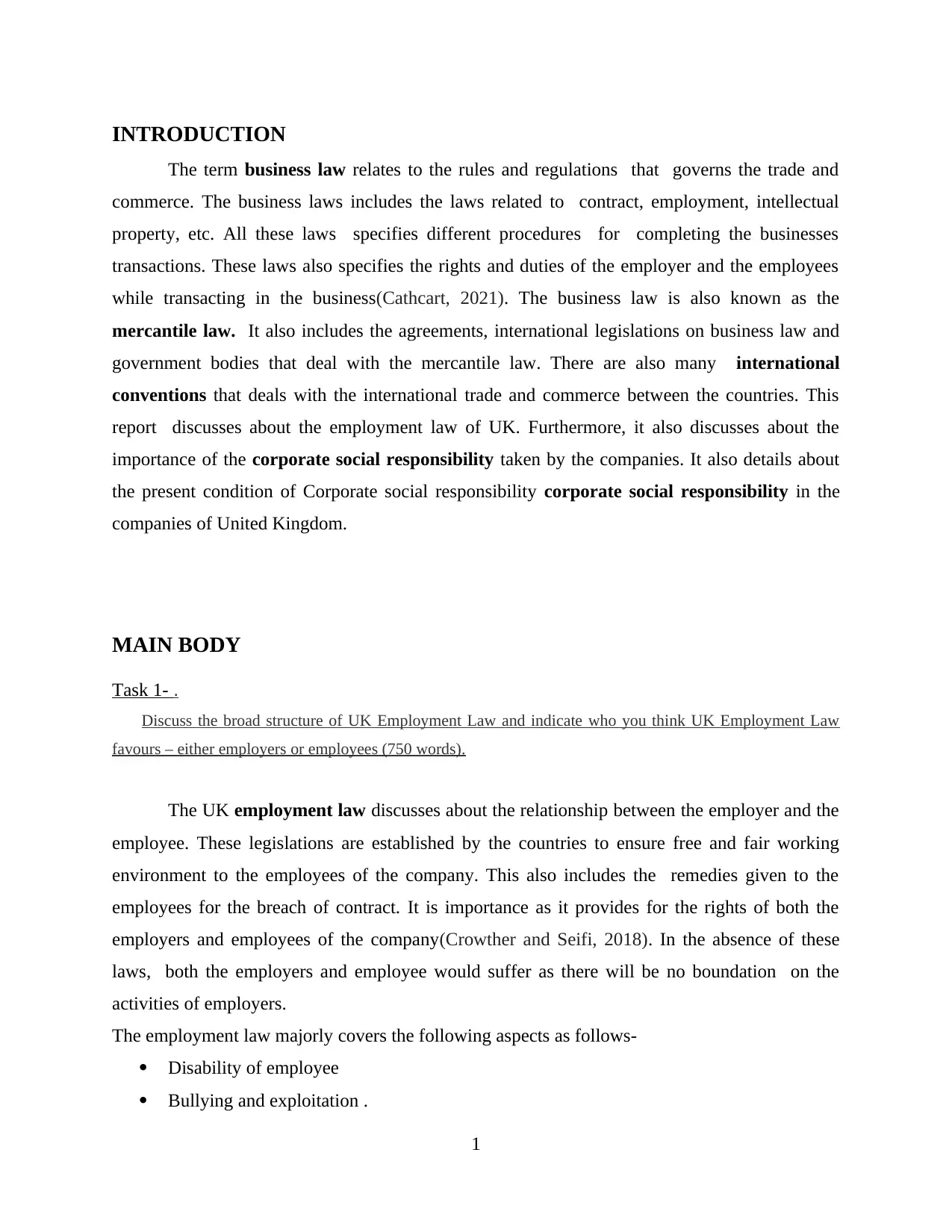
INTRODUCTION
The term business law relates to the rules and regulations that governs the trade and
commerce. The business laws includes the laws related to contract, employment, intellectual
property, etc. All these laws specifies different procedures for completing the businesses
transactions. These laws also specifies the rights and duties of the employer and the employees
while transacting in the business(Cathcart, 2021). The business law is also known as the
mercantile law. It also includes the agreements, international legislations on business law and
government bodies that deal with the mercantile law. There are also many international
conventions that deals with the international trade and commerce between the countries. This
report discusses about the employment law of UK. Furthermore, it also discusses about the
importance of the corporate social responsibility taken by the companies. It also details about
the present condition of Corporate social responsibility corporate social responsibility in the
companies of United Kingdom.
MAIN BODY
Task 1- .
Discuss the broad structure of UK Employment Law and indicate who you think UK Employment Law
favours – either employers or employees (750 words).
The UK employment law discusses about the relationship between the employer and the
employee. These legislations are established by the countries to ensure free and fair working
environment to the employees of the company. This also includes the remedies given to the
employees for the breach of contract. It is importance as it provides for the rights of both the
employers and employees of the company(Crowther and Seifi, 2018). In the absence of these
laws, both the employers and employee would suffer as there will be no boundation on the
activities of employers.
The employment law majorly covers the following aspects as follows-
Disability of employee
Bullying and exploitation .
1
The term business law relates to the rules and regulations that governs the trade and
commerce. The business laws includes the laws related to contract, employment, intellectual
property, etc. All these laws specifies different procedures for completing the businesses
transactions. These laws also specifies the rights and duties of the employer and the employees
while transacting in the business(Cathcart, 2021). The business law is also known as the
mercantile law. It also includes the agreements, international legislations on business law and
government bodies that deal with the mercantile law. There are also many international
conventions that deals with the international trade and commerce between the countries. This
report discusses about the employment law of UK. Furthermore, it also discusses about the
importance of the corporate social responsibility taken by the companies. It also details about
the present condition of Corporate social responsibility corporate social responsibility in the
companies of United Kingdom.
MAIN BODY
Task 1- .
Discuss the broad structure of UK Employment Law and indicate who you think UK Employment Law
favours – either employers or employees (750 words).
The UK employment law discusses about the relationship between the employer and the
employee. These legislations are established by the countries to ensure free and fair working
environment to the employees of the company. This also includes the remedies given to the
employees for the breach of contract. It is importance as it provides for the rights of both the
employers and employees of the company(Crowther and Seifi, 2018). In the absence of these
laws, both the employers and employee would suffer as there will be no boundation on the
activities of employers.
The employment law majorly covers the following aspects as follows-
Disability of employee
Bullying and exploitation .
1
⊘ This is a preview!⊘
Do you want full access?
Subscribe today to unlock all pages.

Trusted by 1+ million students worldwide
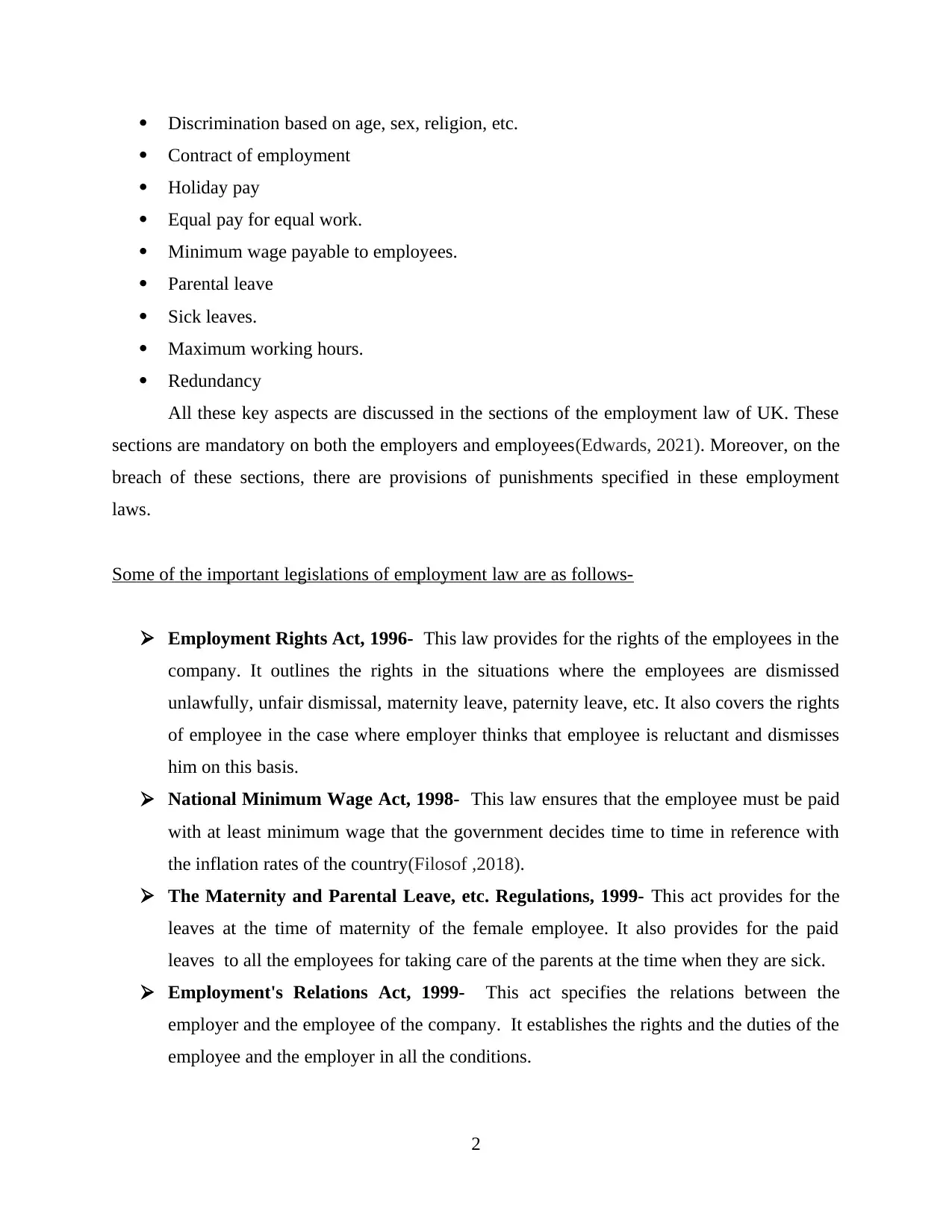
Discrimination based on age, sex, religion, etc.
Contract of employment
Holiday pay
Equal pay for equal work.
Minimum wage payable to employees.
Parental leave
Sick leaves.
Maximum working hours.
Redundancy
All these key aspects are discussed in the sections of the employment law of UK. These
sections are mandatory on both the employers and employees(Edwards, 2021). Moreover, on the
breach of these sections, there are provisions of punishments specified in these employment
laws.
Some of the important legislations of employment law are as follows-
Employment Rights Act, 1996- This law provides for the rights of the employees in the
company. It outlines the rights in the situations where the employees are dismissed
unlawfully, unfair dismissal, maternity leave, paternity leave, etc. It also covers the rights
of employee in the case where employer thinks that employee is reluctant and dismisses
him on this basis.
National Minimum Wage Act, 1998- This law ensures that the employee must be paid
with at least minimum wage that the government decides time to time in reference with
the inflation rates of the country(Filosof ,2018).
The Maternity and Parental Leave, etc. Regulations, 1999- This act provides for the
leaves at the time of maternity of the female employee. It also provides for the paid
leaves to all the employees for taking care of the parents at the time when they are sick.
Employment's Relations Act, 1999- This act specifies the relations between the
employer and the employee of the company. It establishes the rights and the duties of the
employee and the employer in all the conditions.
2
Contract of employment
Holiday pay
Equal pay for equal work.
Minimum wage payable to employees.
Parental leave
Sick leaves.
Maximum working hours.
Redundancy
All these key aspects are discussed in the sections of the employment law of UK. These
sections are mandatory on both the employers and employees(Edwards, 2021). Moreover, on the
breach of these sections, there are provisions of punishments specified in these employment
laws.
Some of the important legislations of employment law are as follows-
Employment Rights Act, 1996- This law provides for the rights of the employees in the
company. It outlines the rights in the situations where the employees are dismissed
unlawfully, unfair dismissal, maternity leave, paternity leave, etc. It also covers the rights
of employee in the case where employer thinks that employee is reluctant and dismisses
him on this basis.
National Minimum Wage Act, 1998- This law ensures that the employee must be paid
with at least minimum wage that the government decides time to time in reference with
the inflation rates of the country(Filosof ,2018).
The Maternity and Parental Leave, etc. Regulations, 1999- This act provides for the
leaves at the time of maternity of the female employee. It also provides for the paid
leaves to all the employees for taking care of the parents at the time when they are sick.
Employment's Relations Act, 1999- This act specifies the relations between the
employer and the employee of the company. It establishes the rights and the duties of the
employee and the employer in all the conditions.
2
Paraphrase This Document
Need a fresh take? Get an instant paraphrase of this document with our AI Paraphraser
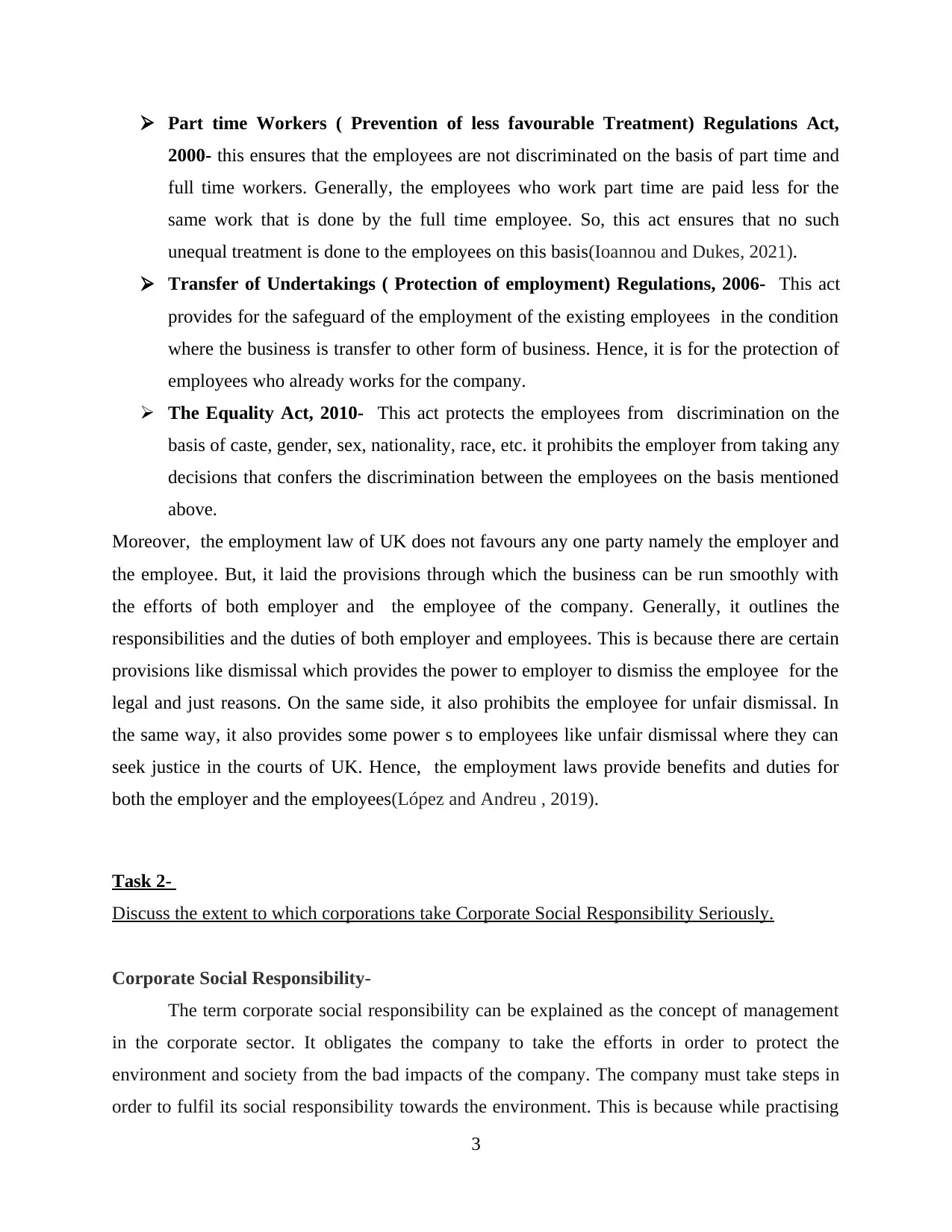
Part time Workers ( Prevention of less favourable Treatment) Regulations Act,
2000- this ensures that the employees are not discriminated on the basis of part time and
full time workers. Generally, the employees who work part time are paid less for the
same work that is done by the full time employee. So, this act ensures that no such
unequal treatment is done to the employees on this basis(Ioannou and Dukes, 2021).
Transfer of Undertakings ( Protection of employment) Regulations, 2006- This act
provides for the safeguard of the employment of the existing employees in the condition
where the business is transfer to other form of business. Hence, it is for the protection of
employees who already works for the company.
The Equality Act, 2010- This act protects the employees from discrimination on the
basis of caste, gender, sex, nationality, race, etc. it prohibits the employer from taking any
decisions that confers the discrimination between the employees on the basis mentioned
above.
Moreover, the employment law of UK does not favours any one party namely the employer and
the employee. But, it laid the provisions through which the business can be run smoothly with
the efforts of both employer and the employee of the company. Generally, it outlines the
responsibilities and the duties of both employer and employees. This is because there are certain
provisions like dismissal which provides the power to employer to dismiss the employee for the
legal and just reasons. On the same side, it also prohibits the employee for unfair dismissal. In
the same way, it also provides some power s to employees like unfair dismissal where they can
seek justice in the courts of UK. Hence, the employment laws provide benefits and duties for
both the employer and the employees(López and Andreu , 2019).
Task 2-
Discuss the extent to which corporations take Corporate Social Responsibility Seriously.
Corporate Social Responsibility-
The term corporate social responsibility can be explained as the concept of management
in the corporate sector. It obligates the company to take the efforts in order to protect the
environment and society from the bad impacts of the company. The company must take steps in
order to fulfil its social responsibility towards the environment. This is because while practising
3
2000- this ensures that the employees are not discriminated on the basis of part time and
full time workers. Generally, the employees who work part time are paid less for the
same work that is done by the full time employee. So, this act ensures that no such
unequal treatment is done to the employees on this basis(Ioannou and Dukes, 2021).
Transfer of Undertakings ( Protection of employment) Regulations, 2006- This act
provides for the safeguard of the employment of the existing employees in the condition
where the business is transfer to other form of business. Hence, it is for the protection of
employees who already works for the company.
The Equality Act, 2010- This act protects the employees from discrimination on the
basis of caste, gender, sex, nationality, race, etc. it prohibits the employer from taking any
decisions that confers the discrimination between the employees on the basis mentioned
above.
Moreover, the employment law of UK does not favours any one party namely the employer and
the employee. But, it laid the provisions through which the business can be run smoothly with
the efforts of both employer and the employee of the company. Generally, it outlines the
responsibilities and the duties of both employer and employees. This is because there are certain
provisions like dismissal which provides the power to employer to dismiss the employee for the
legal and just reasons. On the same side, it also prohibits the employee for unfair dismissal. In
the same way, it also provides some power s to employees like unfair dismissal where they can
seek justice in the courts of UK. Hence, the employment laws provide benefits and duties for
both the employer and the employees(López and Andreu , 2019).
Task 2-
Discuss the extent to which corporations take Corporate Social Responsibility Seriously.
Corporate Social Responsibility-
The term corporate social responsibility can be explained as the concept of management
in the corporate sector. It obligates the company to take the efforts in order to protect the
environment and society from the bad impacts of the company. The company must take steps in
order to fulfil its social responsibility towards the environment. This is because while practising
3
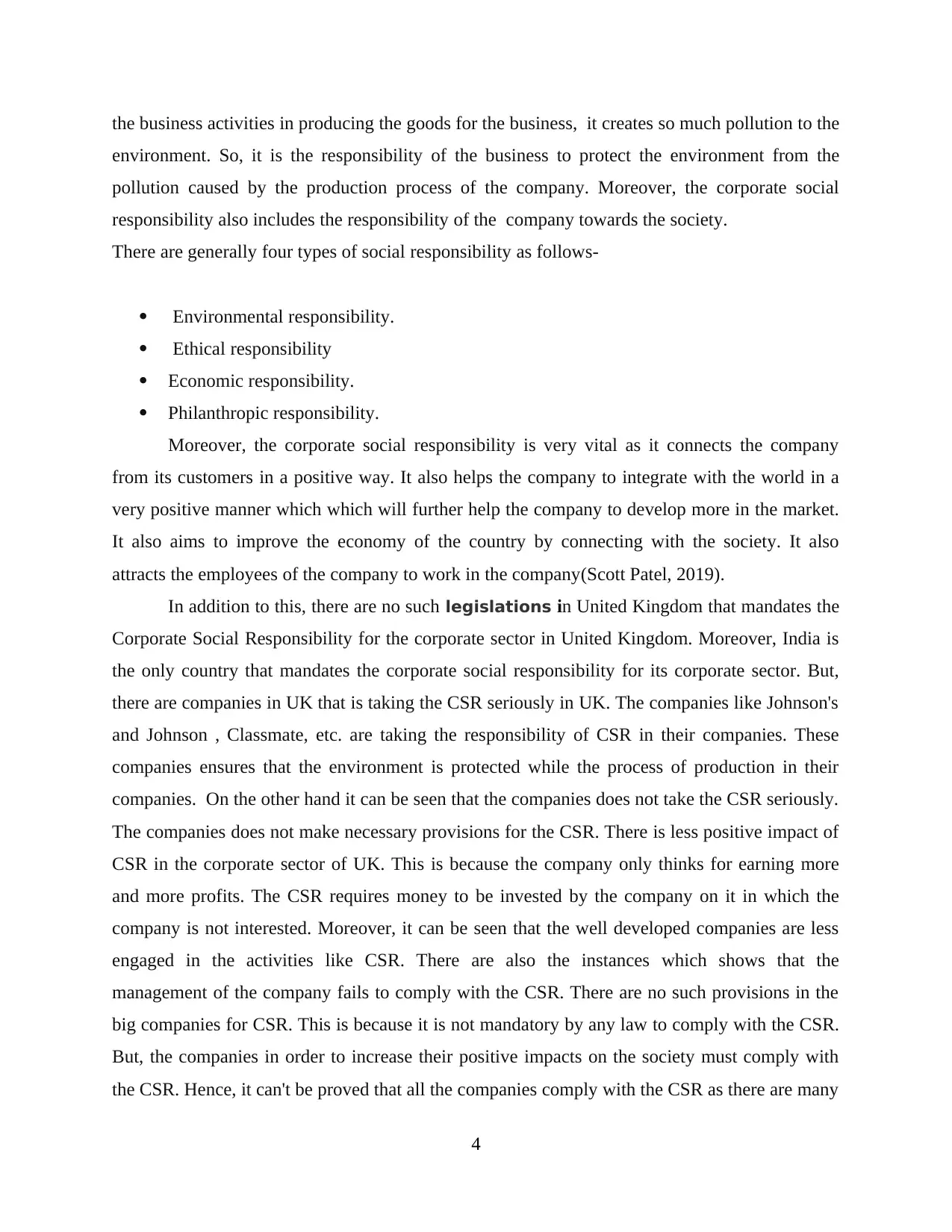
the business activities in producing the goods for the business, it creates so much pollution to the
environment. So, it is the responsibility of the business to protect the environment from the
pollution caused by the production process of the company. Moreover, the corporate social
responsibility also includes the responsibility of the company towards the society.
There are generally four types of social responsibility as follows-
Environmental responsibility.
Ethical responsibility
Economic responsibility.
Philanthropic responsibility.
Moreover, the corporate social responsibility is very vital as it connects the company
from its customers in a positive way. It also helps the company to integrate with the world in a
very positive manner which which will further help the company to develop more in the market.
It also aims to improve the economy of the country by connecting with the society. It also
attracts the employees of the company to work in the company(Scott Patel, 2019).
In addition to this, there are no such legislations in United Kingdom that mandates the
Corporate Social Responsibility for the corporate sector in United Kingdom. Moreover, India is
the only country that mandates the corporate social responsibility for its corporate sector. But,
there are companies in UK that is taking the CSR seriously in UK. The companies like Johnson's
and Johnson , Classmate, etc. are taking the responsibility of CSR in their companies. These
companies ensures that the environment is protected while the process of production in their
companies. On the other hand it can be seen that the companies does not take the CSR seriously.
The companies does not make necessary provisions for the CSR. There is less positive impact of
CSR in the corporate sector of UK. This is because the company only thinks for earning more
and more profits. The CSR requires money to be invested by the company on it in which the
company is not interested. Moreover, it can be seen that the well developed companies are less
engaged in the activities like CSR. There are also the instances which shows that the
management of the company fails to comply with the CSR. There are no such provisions in the
big companies for CSR. This is because it is not mandatory by any law to comply with the CSR.
But, the companies in order to increase their positive impacts on the society must comply with
the CSR. Hence, it can't be proved that all the companies comply with the CSR as there are many
4
environment. So, it is the responsibility of the business to protect the environment from the
pollution caused by the production process of the company. Moreover, the corporate social
responsibility also includes the responsibility of the company towards the society.
There are generally four types of social responsibility as follows-
Environmental responsibility.
Ethical responsibility
Economic responsibility.
Philanthropic responsibility.
Moreover, the corporate social responsibility is very vital as it connects the company
from its customers in a positive way. It also helps the company to integrate with the world in a
very positive manner which which will further help the company to develop more in the market.
It also aims to improve the economy of the country by connecting with the society. It also
attracts the employees of the company to work in the company(Scott Patel, 2019).
In addition to this, there are no such legislations in United Kingdom that mandates the
Corporate Social Responsibility for the corporate sector in United Kingdom. Moreover, India is
the only country that mandates the corporate social responsibility for its corporate sector. But,
there are companies in UK that is taking the CSR seriously in UK. The companies like Johnson's
and Johnson , Classmate, etc. are taking the responsibility of CSR in their companies. These
companies ensures that the environment is protected while the process of production in their
companies. On the other hand it can be seen that the companies does not take the CSR seriously.
The companies does not make necessary provisions for the CSR. There is less positive impact of
CSR in the corporate sector of UK. This is because the company only thinks for earning more
and more profits. The CSR requires money to be invested by the company on it in which the
company is not interested. Moreover, it can be seen that the well developed companies are less
engaged in the activities like CSR. There are also the instances which shows that the
management of the company fails to comply with the CSR. There are no such provisions in the
big companies for CSR. This is because it is not mandatory by any law to comply with the CSR.
But, the companies in order to increase their positive impacts on the society must comply with
the CSR. Hence, it can't be proved that all the companies comply with the CSR as there are many
4
⊘ This is a preview!⊘
Do you want full access?
Subscribe today to unlock all pages.

Trusted by 1+ million students worldwide
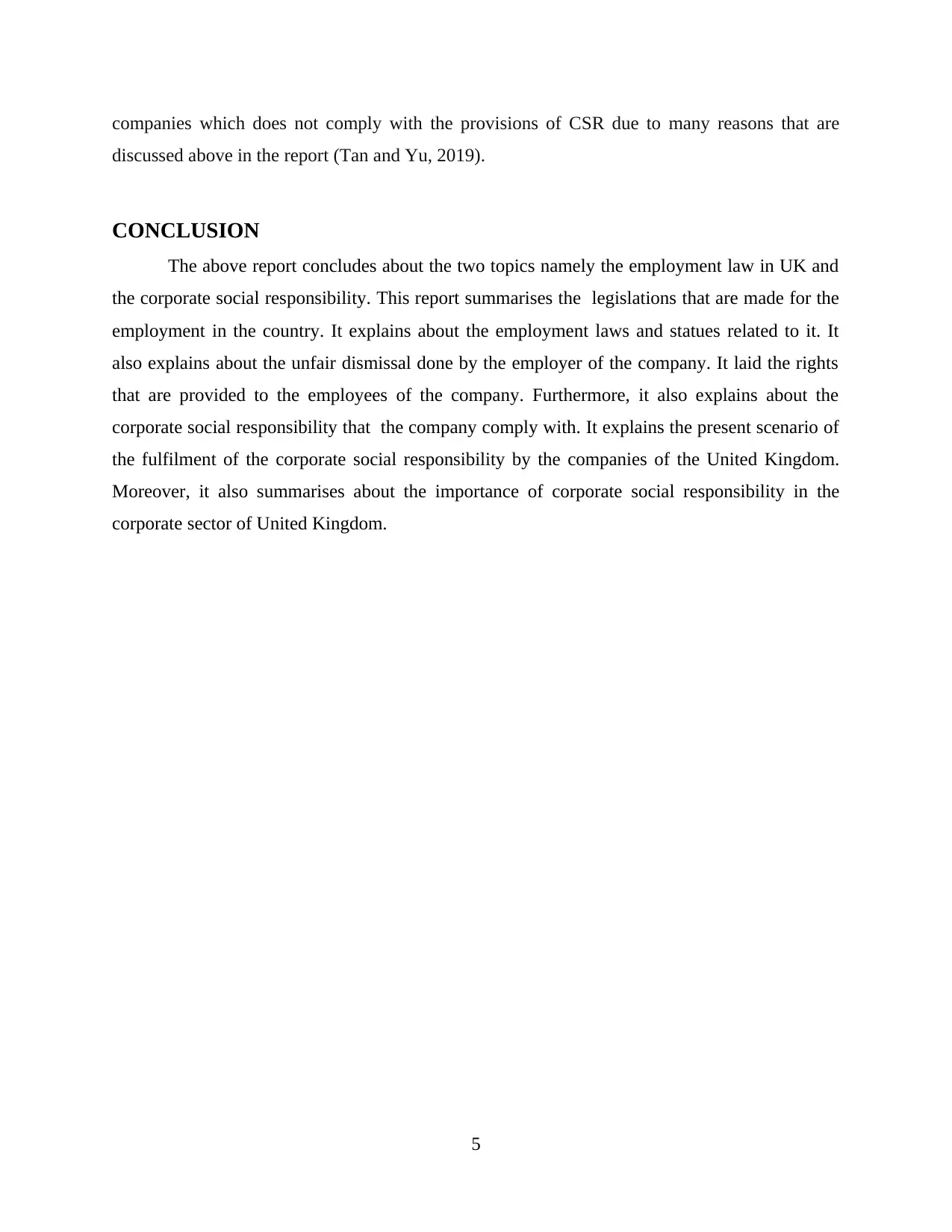
companies which does not comply with the provisions of CSR due to many reasons that are
discussed above in the report (Tan and Yu, 2019).
CONCLUSION
The above report concludes about the two topics namely the employment law in UK and
the corporate social responsibility. This report summarises the legislations that are made for the
employment in the country. It explains about the employment laws and statues related to it. It
also explains about the unfair dismissal done by the employer of the company. It laid the rights
that are provided to the employees of the company. Furthermore, it also explains about the
corporate social responsibility that the company comply with. It explains the present scenario of
the fulfilment of the corporate social responsibility by the companies of the United Kingdom.
Moreover, it also summarises about the importance of corporate social responsibility in the
corporate sector of United Kingdom.
5
discussed above in the report (Tan and Yu, 2019).
CONCLUSION
The above report concludes about the two topics namely the employment law in UK and
the corporate social responsibility. This report summarises the legislations that are made for the
employment in the country. It explains about the employment laws and statues related to it. It
also explains about the unfair dismissal done by the employer of the company. It laid the rights
that are provided to the employees of the company. Furthermore, it also explains about the
corporate social responsibility that the company comply with. It explains the present scenario of
the fulfilment of the corporate social responsibility by the companies of the United Kingdom.
Moreover, it also summarises about the importance of corporate social responsibility in the
corporate sector of United Kingdom.
5
Paraphrase This Document
Need a fresh take? Get an instant paraphrase of this document with our AI Paraphraser
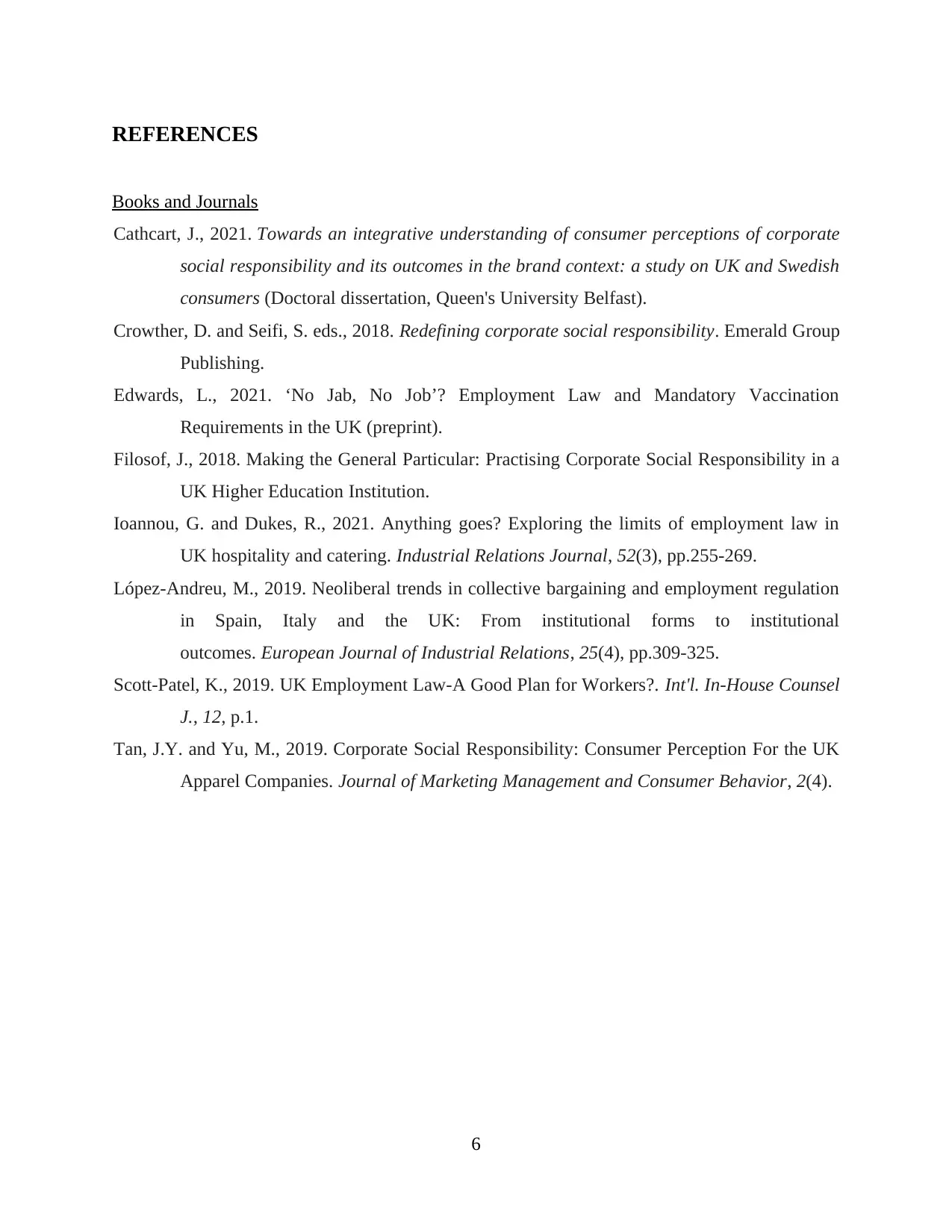
REFERENCES
Books and Journals
Cathcart, J., 2021. Towards an integrative understanding of consumer perceptions of corporate
social responsibility and its outcomes in the brand context: a study on UK and Swedish
consumers (Doctoral dissertation, Queen's University Belfast).
Crowther, D. and Seifi, S. eds., 2018. Redefining corporate social responsibility. Emerald Group
Publishing.
Edwards, L., 2021. ‘No Jab, No Job’? Employment Law and Mandatory Vaccination
Requirements in the UK (preprint).
Filosof, J., 2018. Making the General Particular: Practising Corporate Social Responsibility in a
UK Higher Education Institution.
Ioannou, G. and Dukes, R., 2021. Anything goes? Exploring the limits of employment law in
UK hospitality and catering. Industrial Relations Journal, 52(3), pp.255-269.
López-Andreu, M., 2019. Neoliberal trends in collective bargaining and employment regulation
in Spain, Italy and the UK: From institutional forms to institutional
outcomes. European Journal of Industrial Relations, 25(4), pp.309-325.
Scott-Patel, K., 2019. UK Employment Law-A Good Plan for Workers?. Int'l. In-House Counsel
J., 12, p.1.
Tan, J.Y. and Yu, M., 2019. Corporate Social Responsibility: Consumer Perception For the UK
Apparel Companies. Journal of Marketing Management and Consumer Behavior, 2(4).
6
Books and Journals
Cathcart, J., 2021. Towards an integrative understanding of consumer perceptions of corporate
social responsibility and its outcomes in the brand context: a study on UK and Swedish
consumers (Doctoral dissertation, Queen's University Belfast).
Crowther, D. and Seifi, S. eds., 2018. Redefining corporate social responsibility. Emerald Group
Publishing.
Edwards, L., 2021. ‘No Jab, No Job’? Employment Law and Mandatory Vaccination
Requirements in the UK (preprint).
Filosof, J., 2018. Making the General Particular: Practising Corporate Social Responsibility in a
UK Higher Education Institution.
Ioannou, G. and Dukes, R., 2021. Anything goes? Exploring the limits of employment law in
UK hospitality and catering. Industrial Relations Journal, 52(3), pp.255-269.
López-Andreu, M., 2019. Neoliberal trends in collective bargaining and employment regulation
in Spain, Italy and the UK: From institutional forms to institutional
outcomes. European Journal of Industrial Relations, 25(4), pp.309-325.
Scott-Patel, K., 2019. UK Employment Law-A Good Plan for Workers?. Int'l. In-House Counsel
J., 12, p.1.
Tan, J.Y. and Yu, M., 2019. Corporate Social Responsibility: Consumer Perception For the UK
Apparel Companies. Journal of Marketing Management and Consumer Behavior, 2(4).
6
1 out of 8
Related Documents
Your All-in-One AI-Powered Toolkit for Academic Success.
+13062052269
info@desklib.com
Available 24*7 on WhatsApp / Email
![[object Object]](/_next/static/media/star-bottom.7253800d.svg)
Unlock your academic potential
Copyright © 2020–2026 A2Z Services. All Rights Reserved. Developed and managed by ZUCOL.




